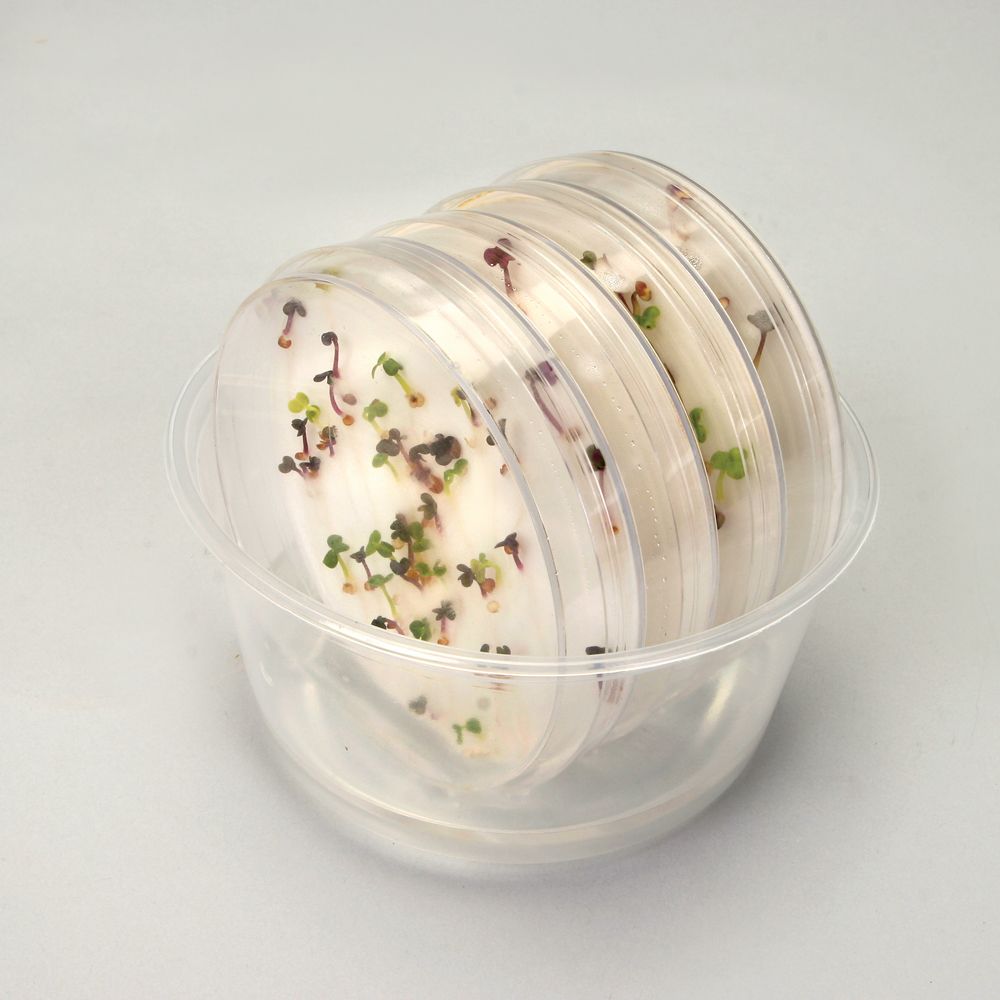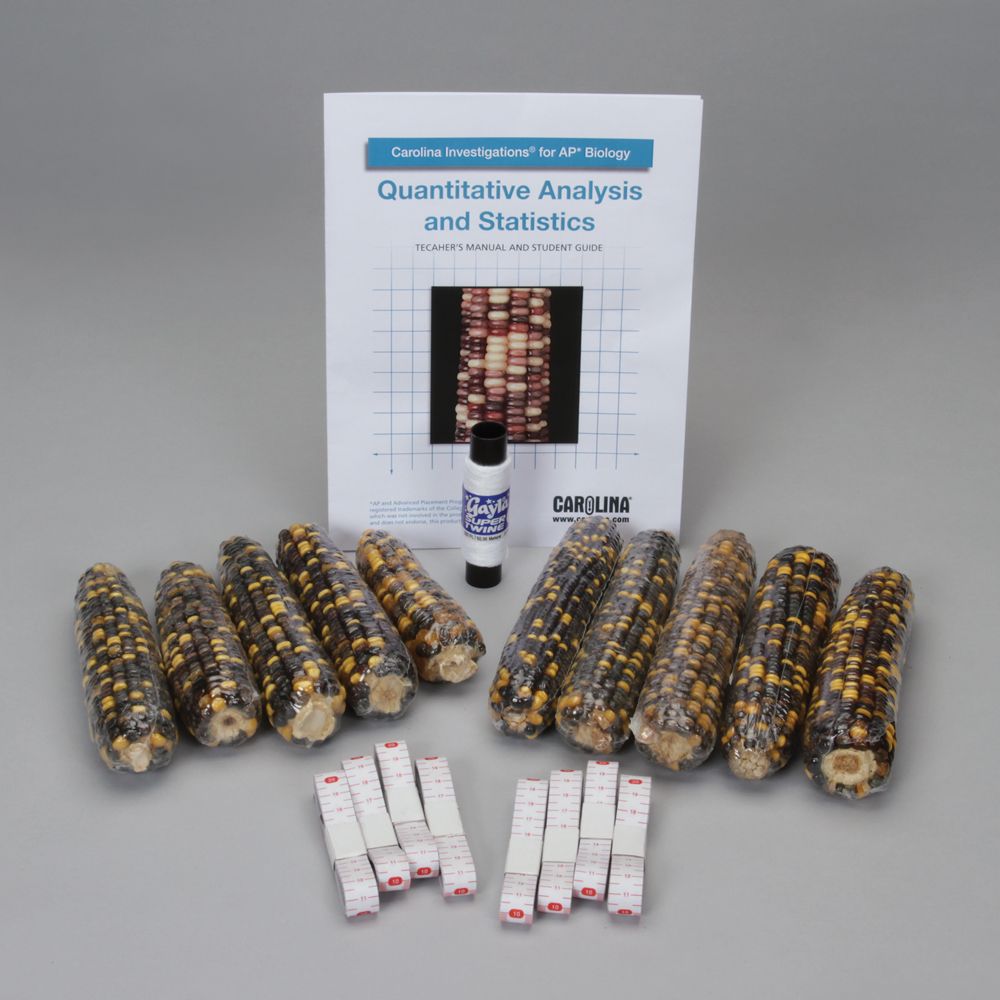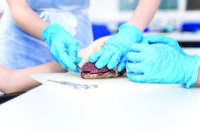Mendelian genetics is the core content for all genetics studies. Concepts of genotypes and phenotypes are established, parental and filial generations are defined, and patterns of inheritance explained. Mendel’s laws guide further, more complex studies in genetics. Carolina offers kits with your choice of 3 different organisms—Wisconsin Fast Plants, genetic corn, and Daphnia—all with a minimum of 2 easily observable traits that provide students hands-on experiences to collect and analyze data just like Mendel did with his plants.
This guide covers the information students need to know, provides links to products and free digital resources, and includes suggestions for hands-on labs that reinforce student learning. We offer a variety of products and resources to help you teach this concept. They include:
- Models and manipulatives to simplify teaching Mendelian genetics
- Genetic activities, experiments, and kits
- Free resources for you and your students
The major areas covered in this topic
Monohybrid Genetics
Monohybrid genetics and the use of Punnett squares form the foundation of Mendelian genetics. Students conceptualize parental and filial generations, explain homozygous and heterozygous genotypes, relate genotypes to phenotypes, and predict the outcome of parental crosses.
Wisconsin Fast Plants: 72 Hour Monohybrid Genetics Kit #158940
Beginning
Easy to Perform Requires little to no prior knowledge
Students germinate seeds from P1, P2, F1, and F2 generations. They observe the seedlings from P1 and F1 and construct an inheritance pattern model to predict the phenotype and genotype of P2 and what the F2 seedlings will look like. After they examine the actual P2 and F2 seedlings, they can revise their model and explain the results based on the data they collected. The driving question that students investigate is, “How do trait variations in Fast Plants seedlings reveal inheritance patterns?” A pre-lab exercise presents a fictional scenario that introduces students to the phenomenon of phenotypic variation and gives students practice identifying an inheritance pattern.
Monohybrid Genetics with Corn Kit #176362
Beginning
Easy to Perform Requires little to no prior knowledge
Students study the inheritance of grain color using ears of corn. Each grain is the F2 of a cross between a homozygous red corn and a homozygous white corn. The lab covers the basics of Mendelian genetics including the inheritance of a single pair of alleles, one of which is dominant and the other recessive. Students score the phenotypes of the F2 and compare their data to their predictions.
Drosophila Monohybrid Cross Kit #171984
Intermediate
Easy to Perform Requires some background knowledge
Students study monohybrid inheritance using the Drosophila strains apterous (wingless) and wild type (winged).
Dihybrid Genetics
After students master monohybrid crosses and the use of Punnet squares, dihybrid crosses are the next step to understanding more complex inheritance patterns. Genetic corn, Drosophila, and Wisconsin Fast Plants can be used to visualize and conceptualize dihybrid genetics.
Carolina BioKits®: Corn Dihybrid Genetics #176380
Beginning
Easy to Perform Requires little to no prior knowledge
Students learn the basic principles of dihybrid inheritance and independent assortment using corn. Students first observe how traits of kernel color and nutrient composition pass from one generation to the next. Then they construct a hypothesis describing the mode of inheritance for each trait.
Wisconsin Fast Plants® 72-Hour Dihybrid Genetics Kit #158939
Beginning
Easy to Perform Requires little to no prior knowledge
Students germinate Wisconsin Fast Plants seeds to study the inheritance of two phenotypes: stem color and seedling height. These phenotypes can be scored in the seedling stage. The P1, F1, and F2 seeds are provided in the kit so students do not have to make the crosses themselves. They germinate the seeds, make predictions, and modify their predictions on the basis of data that they collect.
Drosophila Dihybrid Cross Kit #171990
Advanced
For experienced high school and college classes
Requires some technical skill and background knowledge
Our Drosophila Dihybrid Cross Kit allows students to study dihybrid inheritance using the Drosophila mutants apterous (wingless) and sepia (sepia-eyed).
Exceptions to Mendel's Laws
Follow up your Mendelian genetics studies by examining exceptions to Mendel’s classic genetic laws with kits that have your students go hands-on with codominant traits, sex-linked traits, or multiple genes.
Carolina® Blood Group Genetics with Synthetic Blood Kit #700107
Beginning
Easy to Perform Requires little to no prior knowledge
Students act as blood geneticists at a medical laboratory and serve as expert witnesses in a case of disputed inheritance. Throughout the activity, they must master basic genetic concepts including multiple alleles, codominance, and the relationship of genotype to phenotype. The simulated agglutination reactions are extremely realistic. Kit contains no blood, blood products, or materials of biological origin, so there is no danger of disease transmission.
Carolina® Easy Fly® Sex-Linked Inheritance Kits #172631
Intermediate
Easy to Perform Requires some background knowledge
Experiments with Drosophila just got easier. With Easy Fly® you don’t have to collect virgins for controlled crosses. Easy Fly® does it for you. Prior to shipping, each Easy Fly® culture is heat shocked, which kills all the males. Adults and pupae in an Easy Fly® culture are all females. In this kit, students study sex-linked inheritance by crossing wild-type male and Easy Fly® white-eyed female Drosophila.
Genetics of the Casper Fish Kit #155586
Advanced
For experienced high school and college classes
Requires some technical skill and background knowledge
In this kit, students crossbreed zebra fish males and Casper Fish® females and observe the embryological development of the F1 generation. This engaging kit not only allows students to watch cellular division and differentiation, it also incorporates the basics of inheritance. While observing embryological development of the collected transparent embryos, your students construct dihybrid crosses to predict the genotypic and phenotypic frequencies of the F1 and F2 generations.
Model Genetic Organisms
We offer unique opportunities to work with model organisms—such as genetic corn (Zea mays), Wisconsin Fast Plants (Brassica rapa), and fruit flies (Drosophila melanogaster)—in your genetics lab. These organisms allow students to analyze and understand genetic crosses, study alleles, recognize different phenotypes, and compare predicted versus actual results.
Use this infographic to decide which organism is right for your genetics course.

Genetic Corn
Corn is the ideal organism for introducing students to Mendelian genetics. Corn kernels express numerous phenotypes that are easy to recognize. The phenotypes typically used involve the color or shape of the kernel.
We maintain parental stocks of yellow and purple corn colors. Purple corn is the result of a dominant allele, and yellow corn is the result of the recessive allele of the same gene. Each kernel on an ear of genetic corn represents an offspring. This means students can immediately begin collecting data without performing genetic crosses themselves. Since there are generally 200 or more kernels per ear, it takes only a few ears to produce reliable data.
Wisconsin Fast Plants
Wisconsin Fast Plants offer a virtually maintenance-free way to learn about the plant life cycle within just 30-45 days. Classroom plant kits include everything you need—watering system, containers, and nutrients. Provide an interactive way to teach plant biology, environmental science, genetics, and even math with Fast Plants.
Drosophila Cultures
Our vision for the study of genetic research flies fosters innovation. Our flightless fruit fly reduces the chance of escape for a more successful lab. Easy Fly makes genetic work easier, and FlyNap anesthesia simplifies sexing and comparisons.
Genetic Models
Choose from a variety of high-quality models, posters, and DVDs to fit your needs. Check out our selection.
Additional Genetics Support
We have free resources to help you teach this concept, including:
Free Genetics Activities and Resources
- Introduction to Wisconsin Fast Plants®
- Carolina Essentials*: Introduction to Wisconsin Fast Plants® Phenotypes
- Introduction to Phenotypes with Wisconsin Fast Plants®
- 32 Standards Met with Wisconsin Fast Plants®
- Using Fast Plants® to Teach LS3: Heredity: Inheritance and Variation of Traits
- Seed Disks Make Demonstrating Inheritance and Variation of Traits Even Easier
- Hairy Inheritance: Investigating Variation Selection and Evolution with Wisconsin Fast Plants®
*Carolina Essentials activities are free, hands-on, and NGSS-based. These labs are designed to make implementing 3-D learning easy. Students make sense of phenomena while learning concepts essential for understanding scientific processes.
Carolina Care Guides
Explore our complete care guides for detailed information about the organisms along with related resources and FAQs.
Genetics Videos
Looking for some support for your genetics labs? These videos can help.
For More Guidance
These are our top picks. If you don’t see what you’re looking for, we’ll be happy to help you find the right activities and kits to simplify your planning and implementation. If you have questions, please contact us at product@carolina.com.


































